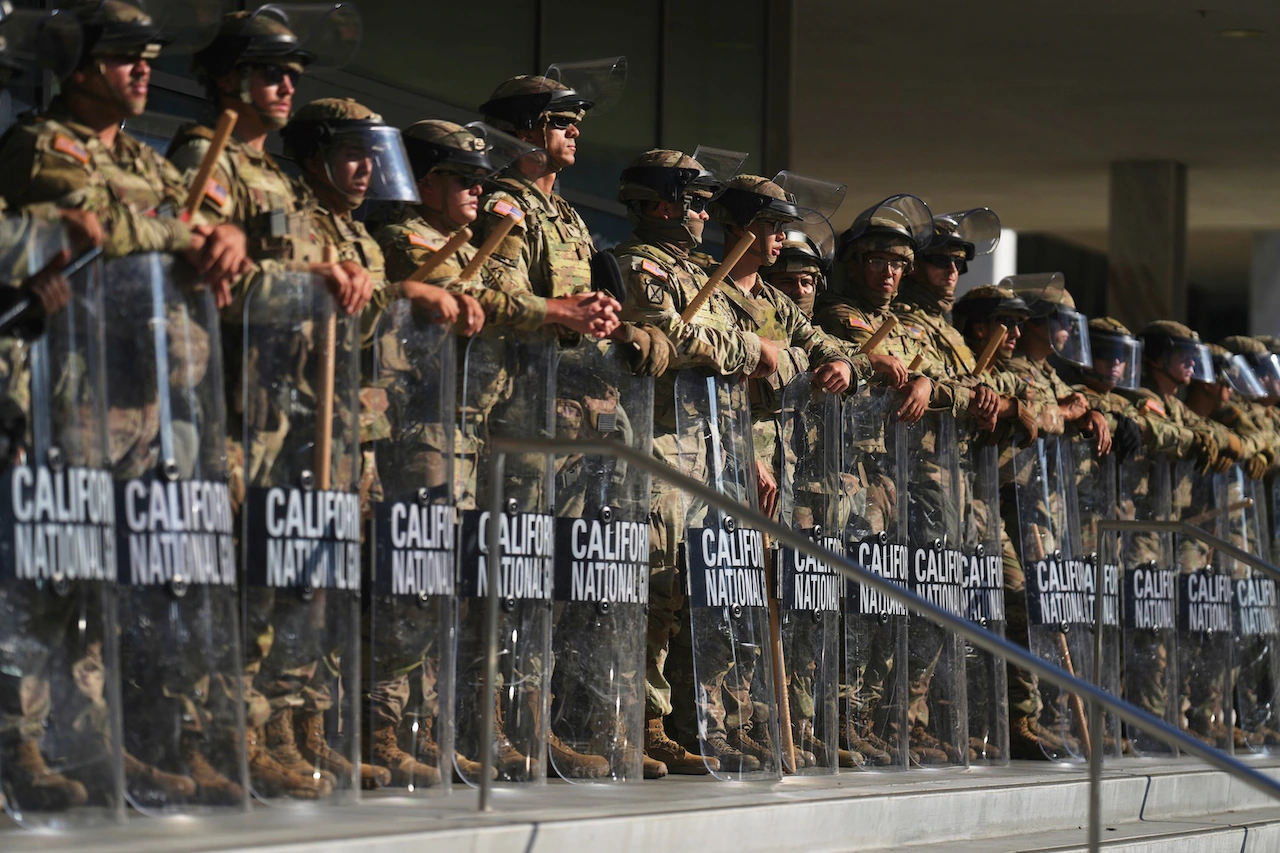
Five days before President Trump authorized sending federal troops to Portland, the city’s attorney joined counterparts from across the country in a court brief supporting California Gov. Gavin Newsom’s legal fight to kick out hundreds of troops that remain in his state.
The attorneys from 32 cities, including Beaverton in Oregon, three counties and the U.S. Conference of Mayors argue that the federal military operation in Los Angeles runs contrary to the public interest and only “inflames tensions with the public.”
State and local police are “best positioned” to provide civilian law enforcement, including crowd control and security, according to the brief filed last Monday with the 9th U.S. Circuit Court of Appeals.
Using the military to perform such duties represents an “unlawful encroachment on state and local authority,” the filing says.
The brief provides a preview of legal arguments that Oregon likely would raise in federal court should the Trump administration carry out the president’s authorization to send federalized National Guard troops to Portland.
Trump promised on social media Saturday to provide “all necessary troops” to protect the U.S. Immigration and Customs Enforcement building in South Portland, where protesters have gathered throughout the summer and dwindled to just a few dozen people.
The brief was filed in support of a Sept. 2 ruling by a federal judge in California that found Trump, his defense secretary and the Defense Department’s deployment of National Guard troops and Marines to Los Angeles in June violated a federal law that prohibits the use of the U.S. military to execute domestic law.
U.S. District Judge Charles R. Breyer of San Francisco issued an injunction barring the federal government’s use of the National Guard in California to make arrests or engage in searches, security patrols, crowd control, evidence collection, interrogations or work as informants.
Breyer said his order did not bar the government from using the troops in ways that are consistent with federal law, such as protecting federal property. His injunction was limited to California.
The Trump administration then urged the 9th Circuit to put a hold on Breyer’s order, pending a full appeal. A three-judge panel of the 9th Circuit put a temporary hold on Breyer’s order on Sept. 4 as the appellate court considers the merit of the matter.
Government lawyers argue that Trump mobilized the National Guard to protect federal property and employees, including those enforcing immigration laws, from violence. They say the Guard members have stayed within that “limited protective mission.”
Portland and the other cities urged the appeals court to allow Breyer’s injunction to take effect.
They contend the troops are acting as a “force multiplier” for federal law enforcement aims despite government claims that they are there to safeguard immigration agents from protesters.
“It sets a dangerous precedent for states and local governments across this nation,” the friend-of-court brief says.
The way the government sent the troops to California without coordination with state officials and local police has disrupted the Los Angeles economy, creating a “de facto” lockdown of neighborhoods across the region, the brief says.
It quoted from 19th century French historian and writer Alex De Tocqueville’s book “Democracy in America” in 1835, which said: “The strength of free peoples resides in the local community. Local institutions are to liberty what primary schools are to science; they put it within the people’s reach.”
The cities that signed onto the brief have a “critical interest” in maintaining sovereignty over local law enforcement, freedom from economic harm and civic prosperity, their lawyers argue. Deployment of troops for domestic policing is legally unfounded, they say.
“Every day that military troops in combat gear, carrying assault rifles and trained to kill in war police in our jurisdictions is a day that sows fear and mistrust in the population,” the brief says.
Portland City Attorney Robert Taylor and Beaverton City Attorney Scott J. Kaplan signed the brief. Some of the other cities included are Seattle, Tacoma, New York, Boston, Chicago, Boulder, Colorado, Hartford, Connecticut, and Providence, Rhode Island.
In Breyer’s opinion, he noted Congress in 1878 passed the Posse Comitatus Act, which prohibited the use of the military for domestic purposes. It bars military forces from direct “involvement in the execution of laws” or actions that “pervade the activities of civilian authorities.”
Congress acted then to prevent the federal government from deploying troops to the South to police polling places.
The Trump administration argues that a “constitutional” exception to the Posse Comitatus Act gives the president authority to protect federal property, employees and federal functions, pointing to part of the federal code, known as Section 12406.
That says the president can call up the National Guard in federal service when the president is unable with regular forces to “execute the laws of the United States,” repel an invasion by a foreign nation or suppress a rebellion or the danger of a rebellion against the authority of the U.S. government.
Such orders, the code says, shall be issued through the “governors of the States,” or in the case of the District of Columbia, through the commanding general of its National Guard.
Breyer rejected the government’s interpretation of the code, finding it was “not grounded in the history” of the legislation, Supreme Court review or “common sense.”
“There is little support in the Founding Era for an inherent constitutional authority for the President to call forth the militia, or to use the military generally, to execute the laws,” he wrote.
While some people engaged in violence in the Los Angeles protests, “there was no rebellion, nor was civilian law enforcement” unable to respond to the protests and enforce the law, the judge wrote.
The Trump administration refused to coordinate with state and local officials and had military troops execute functions that the federal law bars the military from performing, Breyer wrote.
The federal troops set up protective perimeters and traffic blockades and did crowd control in violation of the Posse Comitatus Act, the judge found. Los Angeles police and sheriff’s officials received a “mere two hours’ notice” of federal operations, he said.
The Trump administration’s lack of cooperation with state and local officials and law enforcement raised red flags, the judge said, and the “lack of any showing” that state and local officials were unable to do the work themselves.
While Breyer said he recognized federal employees should be safe from harm, the government must ensure their safety by coordinating with state and local law enforcement agencies.
“To use this as a hook to send military troops alongside federal agents wherever they go proves too much and would frustrate the very purpose of the Posse Comitatus Act,” Breyer concluded.
Breyer also delved into the history of the country’s founding era.
The presence of British troops in the colonies first gave rise to criticisms of the domestic use of military troops in peacetime and public resentment of the use of troops in such a manner sparked the Boston Massacre, he noted.
The judge quoted founding father Alexander Hamilton, who said that “the whole power of raising armies was lodged in the LEGISLATURE, not in the EXECUTIVE,” in The Federalist Papers.
His ruling noted that Defense Secretary Pete Hegseth directed 4,000 federalized National Guard troops and about 700 Marines to Los Angeles in June. Almost three months later, 300 National Guard members remain there, he noted.
Citing Trump’s stated intention to call National Guard troops into federal service in other cities and the “ongoing risk” that the administration would act unlawfully by creating a “national police force with the President as its chief,” Breyer barred the government from violating federal law in California.



